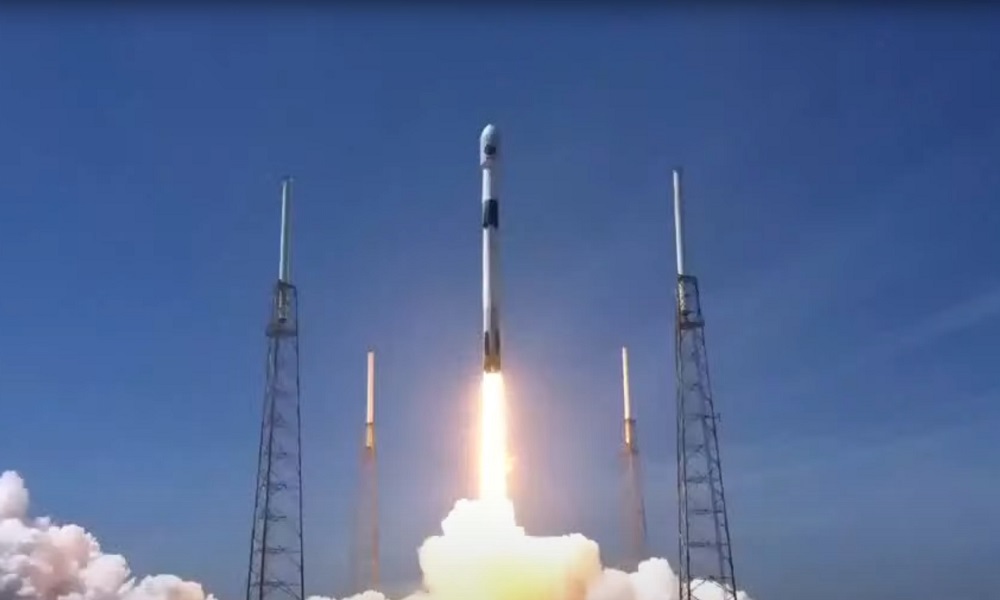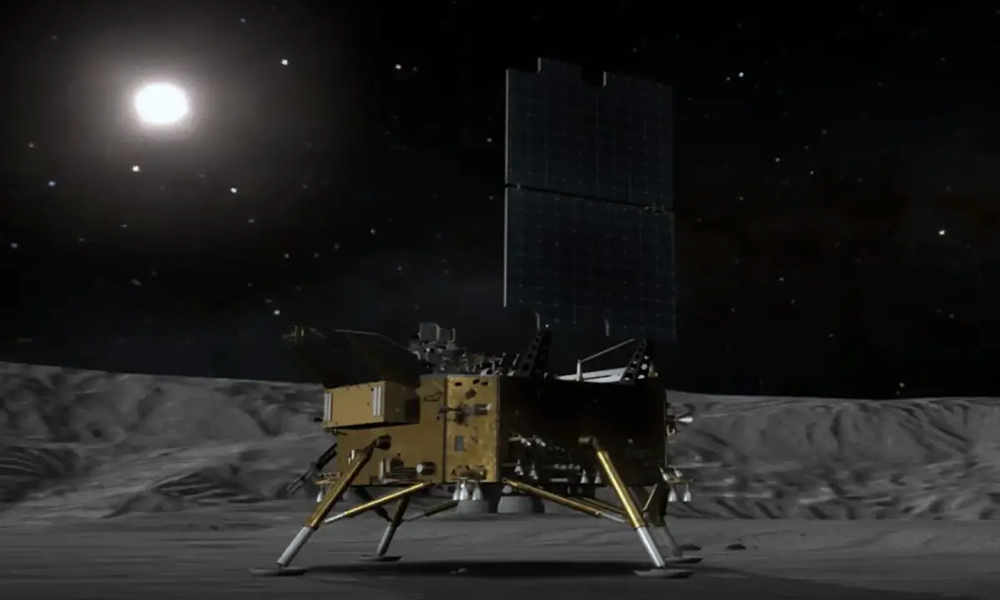Science & Technology
Europe’s Euclid space telescope launched on mission to explore ‘dark universe’

A European-built orbital satellite was launched to space on Saturday from Florida on a mission to shed new light on the mysterious cosmic phenomena known as dark energy and dark matter, unseen forces scientists say account for 95% of the known universe.
The telescope dubbed Euclid, named for the ancient Greek mathematician called the “father of geometry,” was carried aloft in the cargo bay of a SpaceX Falcon 9 rocket that blasted off around 11 a.m. EDT (1500 GMT) from Cape Canaveral Space Force Station.
A livestream of the liftoff was shown on NASA TV.
New insights from the $1.4 billion European Space Agency (ESA) mission, designed to last at least six years, are expected to transform astrophysics and perhaps understanding of the very nature of gravity itself.
Following a short flight to space, Euclid was to be released from the Falcon for a month-long voyage to its destination in solar orbit nearly 1 million miles (1.6 million km) from Earth – a position of gravitational stability between the Earth and sun called the Lagrange Point Two, or L2.
From there, Euclid is designed to explore the evolution of what astrophysicists refer to as the “dark universe,” using a wide-angle telescope to survey galaxies as far away as 10 billion light years from Earth across an immense expanse of the sky beyond our own Milky Way galaxy.
The 2-ton spacecraft is also equipped with instruments designed to measure the intensity and spectrums of infrared light from those galaxies in a way that will precisely determine their distances.
The mission focuses on two foundational components of the dark universe. One is dark matter, the invisible but theoretically influential cosmic scaffolding thought to give shape and texture to the cosmos. The other is dark energy, an equally enigmatic force believed to explain why expansion of the universe, as scientists learned in the 1990s, has long been accelerating.
The possibilities of the mission are reflected by the enormity of Euclid’s inquiry. Scientists estimate dark energy and dark matter together make up 95% of the cosmos, while ordinary matter that we can see accounts for just 5%.
Science & Technology
China, Russia may build nuclear plant on moon to power lunar station, official says
Russia’s space agency Roscosmos said last year it planned to build a nuclear reactor on the moon’s surface with the China National Space Administration (CNSA) by 2035 to power the ILRS.

China is considering building a nuclear plant on the moon to power the International Lunar Research Station (ILRS) it is planning with Russia, a presentation by a senior official showed on Wednesday.
China aims to become a major space power and land astronauts on the moon by 2030, and its planned Chang’e-8 mission for 2028 would lay the groundwork for constructing a permanent, manned lunar base.
In a presentation in Shanghai, the 2028 mission’s Chief Engineer Pei Zhaoyu showed that the lunar base’s energy supply could also depend on large-scale solar arrays, and pipelines and cables for heating and electricity built on the moon’s surface.
Russia’s space agency Roscosmos said last year it planned to build a nuclear reactor on the moon’s surface with the China National Space Administration (CNSA) by 2035 to power the ILRS.
The inclusion of the nuclear power unit in a Chinese space official’s presentation at a conference for officials from the 17 countries and international organisations that make up the ILRS suggests Beijing supports the idea, although it has never formally announced it.
“An important question for the ILRS is power supply, and in this Russia has a natural advantage, when it comes to nuclear power plants, especially sending them into space, it leads the world, it is ahead of the United States,” Wu Weiren, chief designer of China’s lunar exploration program, told Reuters on the sidelines of the conference.
After little progress on talks over a space-based reactor in the past, “I hope this time both countries can send a nuclear reactor to the moon,” Wu said.
China’s timeline to build an outpost on the moon’s south pole coincides with NASA’s more ambitious and advanced Artemis programme, which aims to put U.S. astronauts back on the lunar surface in December 2025.
Wu said last year that a “basic model” of the ILRS, with the Moon’s south pole as its core, would be built by 2035.
In the future, China will create the “555 Project,” inviting 50 countries, 500 international scientific research institutions, and 5,000 overseas researchers to join the ILRS.
Researchers from Roscosmos also presented at the conference in Shanghai, sharing details about plans to look for mineral and water resources, including possibly using lunar material as fuel.
The ILRS preceded Russia’s invasion of Ukraine in 2022 but incentives for cooperation between Roscosmos and CNSA have increased since the outbreak of the war, according to Chinese analysts.
With China’s rapid technological advances and lunar achievements, and as Western sanctions prevent Roscosmos from many imports of space technology and equipment, China can now “alleviate the pressure” on Russia and help it “achieve new breakthroughs in satellite launches, lunar exploration, and space stations,” Liu Ying, a researcher at the Chinese foreign ministry’s diplomatic academy, wrote in a journal article last year.
International Sports
IPL 2025: Robo-Dog ‘Champak’ explained
Covered in a brown fur-like print and fitted with a camera in place of a face, the robot is designed to offer dynamic, on-ground visuals from a dog’s eye view

Organizers of this year’s Indian Premier League (IPL) are blazing a trail when it comes to embracing cutting edge technology and over the past week have deployed an AI-powered robotic dog that is fast growing in popularity among both players and fans.
The mechanical camera-carrying canine, named Champak, is the latest addition to the league’s broadcast team and was introduced to the public before the Delhi Capitals and Mumbai Indians match at the Arun Jaitley Stadium on April 13.
Former New Zealand cricketer and commentator Danny Morrison formally introduced his new broadcast companion before demonstrating the IPL robot dog’s ability to run, jump, respond to various voice commands and even draw a heart shape with its front limbs.
The video clip, put out by the IPL’s social media handles, also shows Mumbai Indians’ players Hardik Pandya, Reece Topley and Delhi Capitals captain Axar Patel interacting with the robot dog and having a blast.
The IPL also called on fans to help name the robot dog, which has been a regular part of the broadcast team in subsequent matches. Fan votes eventually saw the robotic canine named Champak.
During the Lucknow Super Giants vs Chennai Super Kings clash in Lucknow, MS Dhoni couldn’t resist a little fun with the robo-dog – playfully lifting it up and putting it down sideways, much to the crowd’s delight.
Known for his love of dogs, often seen in heart-warming moments with his own pets on social media, MS Dhoni later scooped up the mechanical pup and carried it off, probably for some extra playtime.
Covered in a brown fur-like print and fitted with a camera in place of a face, the robot is designed to offer dynamic, on-ground visuals from a dog’s eye view, bringing fans closer to the action in new and immersive ways.
Comparable to a GoPro-like action cameras, the robot dog enables unique broadcast angles along the sidelines and pitch perimeter.
The IPL robot dog draws clear inspiration from the quadrupeds designed by United States-based robotics company Boston Dynamics.
Similar quadrupeds have been deployed from military logistics to hazardous site inspections. The IPL’s version appears to be a small and playful adaptation.
Have you seen Champak yet?
For cricket fans across the country, tune in today, Monday April 22, to watch Lucknow Super Giants take on Delhi Capitals. The match starts at 5pm Kabul time.
Ariana Television will broadcast the match live and exclusively across Afghanistan and hopefully Champak will once again be out of the field for fans to see.
Science & Technology
NASA rover finds fresh evidence of the warm and wet past of Mars

A mineral called siderite found abundantly in rock drilled by a NASA rover on the surface of Mars is providing fresh evidence of the planet’s warmer and wetter ancient past when it boasted substantial bodies of water and potentially harbored life.
The Curiosity rover, which landed on Mars in 2012 to explore whether Earth’s planetary neighbor was ever able to support microbial life, found the mineral in rock samples drilled at three locations in 2022 and 2023 inside Gale crater, a large impact basin with a mountain in the middle, Reuters reported.
Siderite is an iron carbonate mineral. Its presence in sedimentary rocks formed billions of years ago offers evidence that Mars once had a dense atmosphere rich in carbon dioxide, a gas that would have warmed the planet through the greenhouse effect to the point that it could sustain bodies of liquid water on its surface.
There are features on the Martian landscape that many scientists have interpreted as signs that liquid water once flowed across its surface, with potential oceans, lakes and rivers considered as possible habitats for past microbial life.
Carbon dioxide is the main climate-regulating greenhouse gas on Earth, as it is on Mars and Venus. Its presence in the atmosphere traps heat from the sun, warming the climate.
Until now, evidence indicating the Martian atmosphere previously was rich in carbon dioxide has been sparse. The hypothesis is that when the atmosphere – for reasons not fully understood – evolved from thick and rich in carbon dioxide to thin and starved of this gas, the carbon through geochemical processes became entombed in rocks in the planet’s crust as a carbonate mineral.
The samples obtained by Curiosity, which drills 1.2 to 1.6 inches (3-4 centimeters) down into rock to study its chemical and mineral composition, lend weight to this notion. The samples contained up to 10.5% siderite by weight, as determined by an instrument onboard the car-sized, six-wheeled rover.
“One of the longstanding mysteries in the study of Martian planetary evolution and habitability is: if large amounts of carbon dioxide were required to warm the planet and stabilize liquid water, why are there so few detections of carbonate minerals on the Martian surface?” said University of Calgary geochemist Benjamin Tutolo, a participating scientist on NASA’s Mars Science Laboratory Curiosity rover team and lead author of the study published on Thursday in the journal Science, opens new tab.
“Models predict that carbonate minerals should be widespread. But, to date, rover-based investigations and satellite-based orbital surveys of the Martian surface had found little evidence of their presence,” Tutolo added.
Because rock similar to that sampled by the rover has been identified globally on Mars, the researchers suspect it too contains an abundance of carbonate minerals and may hold a substantial portion of the carbon dioxide that once warmed Mars.
The Gale crater sedimentary rocks – sandstones and mudstones – are thought to have been deposited around 3.5 billion years ago, when this was the site of a lake and before the Martian climate underwent a dramatic change.
“The shift of Mars’ surface from more habitable in the past, to apparently sterile today, is the largest-known environmental catastrophe,” said planetary scientist and study co-author Edwin Kite of the University of Chicago and Astera Institute.
“We do not know the cause of this change, but Mars has a very thin carbon dioxide atmosphere today, and there is evidence that the atmosphere was thicker in the past. This puts a premium on understanding where the carbon went, so discovering a major unsuspected deposit of carbon-rich materials is an important new clue,” Kite added.
The rover’s findings offer insight into the carbon cycle on ancient Mars.
On Earth, volcanoes spew carbon dioxide into the atmosphere, and the gas is absorbed by surface waters – mainly the ocean – and combines with elements such as calcium to form limestone rock. Through the geological process called plate tectonics, this rock is reheated and the carbon is ultimately released again into the atmosphere through volcanism. Mars, however, lacks plate tectonics.
“The important feature of the ancient Martian carbon cycle that we outline in this study is that it was imbalanced. In other words, substantially more carbon dioxide seems to have been sequestered into the rocks than was subsequently released back into the atmosphere,” Tutolo said.
“Models of Martian climate evolution can now incorporate our new analyses, and in turn, help to refine the role of this imbalanced carbon cycle in maintaining, and ultimately losing, habitability over Mars’ planetary history,” Tutolo added.
-

 World5 days ago
World5 days agoThousands of protesters rally against Trump across US
-

 Latest News5 days ago
Latest News5 days agoPolio vaccination campaign launched in Afghanistan
-

 International Sports3 days ago
International Sports3 days agoIPL 2025: Robo-Dog ‘Champak’ explained
-

 International Sports5 days ago
International Sports5 days agoIPL 2025: 14-year-old Vaibhav Suryavanshi becomes youngest IPL player
-

 Latest News3 days ago
Latest News3 days agoAriana Afghan Airlines increases flights to China
-

 Latest News4 days ago
Latest News4 days agoChina invites various Afghan delegations to attend Shanghai forums
-

 World4 days ago
World4 days agoPentagon chief Hegseth shared sensitive Yemen war plans in second Signal chat, source says
-

 Regional4 days ago
Regional4 days agoJD Vance arrives in India, to hold talks with Modi under US tariffs shadow
























